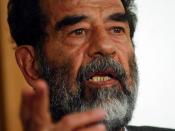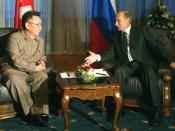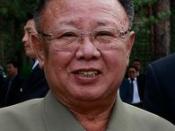Not So Normal After allIn his essay, ÃÂDangerously UniqueÃÂ, Moises Naim sets out to prove to readers that they are not normal, at least in relation to the majority of the rest of the world. NaimÃÂs thesis is geared toward arguing the fact that while people in rich countries like America have steady jobs, access to food and electricity, and political freedoms; the actual majority of the rest of the world does not. He defines ÃÂnormalÃÂ as implying ÃÂsomething that is ÃÂusual, typical, or expected.ÃÂ Therefore, normal is not only what is statistically most frequent, but also what others assume it to beÃÂ (112). After setting the reader up with the definition of the word ÃÂnormalÃÂ, he supplies numerous statistics and studies which support his argument, a very logically appealing one, that we as Americans are not normal, we are not the majority, we are the minorityÃÂ politically, economically, and financially, among many other things.
Naim finishes off his argument with the idea that our assumptions and expectations of ÃÂnormalcyÃÂ are quite costly and dangerous, and that our generosity as a nation, while not over looked, is simply not a feasible solution to rest of the worldÃÂs problems. It is very hard to find a way to argue against NaimÃÂs use of the rhetoric of logos in his essay, as he delivers his argument with precise facts and studies from multiple sources.
Take for example a very ÃÂnormalÃÂ assumption for Americans, food. Here in America, three meals a day is the minimum, especially now, as many Americans are becoming over weight, proving we have too much food. However, throughout the rest of the world, according to NaimÃÂs article, 852 million people are not getting three meals per day. Further more, if they actually do receive three meals per day, the meals are most likely not calorically sufficient enough to sustain an average human being.
Statistically speaking, a ÃÂnormal human being in todayÃÂs world is poor, lives in oppressive physical, social, and political conditions, and is ruled by unresponsive and corrupt governmentÃÂ (112). About half of the worldÃÂs population lives on less than the equivalent of two dollars a day, and another third of the available labor force is unemployed, according to the World Bank. It is assumptions like these that Naim argues Americans take for granted to be normal. We expect people to have cell phones, cars, and shelter in the United States, while roughly 1.6 billion people do not have access to electricity, and 30% of the worldÃÂs population has never even made a phone call from a land line, let alone a mobile phone.
Naim goes on to argue that our ÃÂrich world assumptions about what constitutes the global norm are costly illusionsÃÂ (111). Our government sends billions of dollars of wasted aid to foreign governments in hopes that they will be able to utilize this money to improve their countries status. Again, it is our assumptions of the norm that cause this money to be wasted, as we do not realize that these governments or foreign leaders are either A) not capable of utilizing the money, or B) not willing to utilize the money for the benefit if its citizens. While it is clear that as Americans we want to help others in any way possible, we find it hard to realize what is normal, and what is possible and plausible for another country; a country without electricity or adequate food supply, or a country under oppression by a dictator like Saddam Hussein of Iraq, or Kim Jong Il of North Korea. If we truly want to make a difference in the world, we have to understand that our capabilities are not normal, they are an exception.
NaimÃÂs argument is very hard to disagree with. He uses the rhetorical appeal of logos flawlessly, to prove, not persuade the reader of his thesis. Naim effectively uses many statistics and studies to justify and solidify his idea that Americans are not ÃÂnormalÃÂ compared to the rest of the world, and that our assumption of freedom, health, wealth, and luxury are far from the majority of what the rest of the world experiences and expects to encounter on a daily basis.
Naim, Moises. "Dangerously Unique." Readers Digest 2 Nov. 2006: 1.





